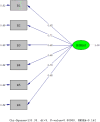Psychometric validation of the Farsi Bergen social media addiction scale (BSMAS) among Iranian adults
- PMID: 40389950
- PMCID: PMC12087144
- DOI: 10.1186/s12889-025-23081-9
Psychometric validation of the Farsi Bergen social media addiction scale (BSMAS) among Iranian adults
Abstract
This study investigated the psychometric characteristics of the Bergen Social Media Addiction Scale (BSMAS) in a sample of Iranian adults aged between 19 and 73 years. In a cross-sectional study carried out between September 2023 and November 2023, 1044 participants (753 female and 291 male) were selected using a convenience sampling method to examine the relationship between BSMAS, Young's internet addiction (YIA), and mental health. Participants completed several questionnaires, including the BSMAS, YIA scale, and Depression Anxiety and Stress Scale (DASS-21). The BSMAS validity and reliability were evaluated using construct validity, reliability, and concurrent validity. Confirmatory factor analysis demonstrated good model fit (e.g., CFI = 0.94), with all items loading significantly. Additionally, the Cronbach's alpha coefficient (0.795), the Guttman's split-half coefficient (0.735), and the McDonald's omega coefficient (0.797) indicate acceptable reliability for the BSMAS. Significant positive relationships were found between the BSMAS and YIA (r = 0.64, p 0.01), depression (r = 0.32, p < 0.01), anxiety (r = 0.32, p < 0.01), and stress (r = 0.37, p < 0.01). We found that females scored higher on the Bergen than males. A negative correlation was also found between the Bergen score and age among all participants. The results suggest that the concurrent validity of the BSMAS is acceptable. In conclusion, the BSMAS is a valid and reliable scale for assessing social media addiction (SMA) evaluations in Iranian populations.
Keywords: Bergen social media addiction scale; Iran; Mental health; Reliability; Validity.
© 2025. The Author(s).
Conflict of interest statement
Declarations. Ethics approval and consent to participate: The research ethics committees of Tarbiat Modares University, Tehran, Iran approved the study, which was carried out in compliance with the Declaration of Helsinki (Approval ID: IR.MODARES.REC.1402.099). Participation had the freedom to decline participation at any time and the choice to provide information or not. The study was entirely voluntary. Responses to the questionnaires were anonymous. Participants gave their written informed consent prior to taking part in the survey. Competing interests: The authors declare no competing interests. Consent of publication: Not Applicable.
Figures
References
-
- Datareportal. Digital 2024: Global Overview Report. 2024 [cited January 2024 3/6/2024]; Available from: https://datareportal.com/reports/digital-2024-global-overview-report
-
- Andreassen CS. Online social network site addiction: A comprehensive review. Curr Addict Rep. 2015;2(2):175–84. - DOI
-
- Griffiths M. A ‘components’ model of addiction within a biopsychosocial framework. Taylor Francis [. 2005. 10.1080/14659890500114359]. - DOI
Publication types
MeSH terms
LinkOut - more resources
Full Text Sources
Miscellaneous



